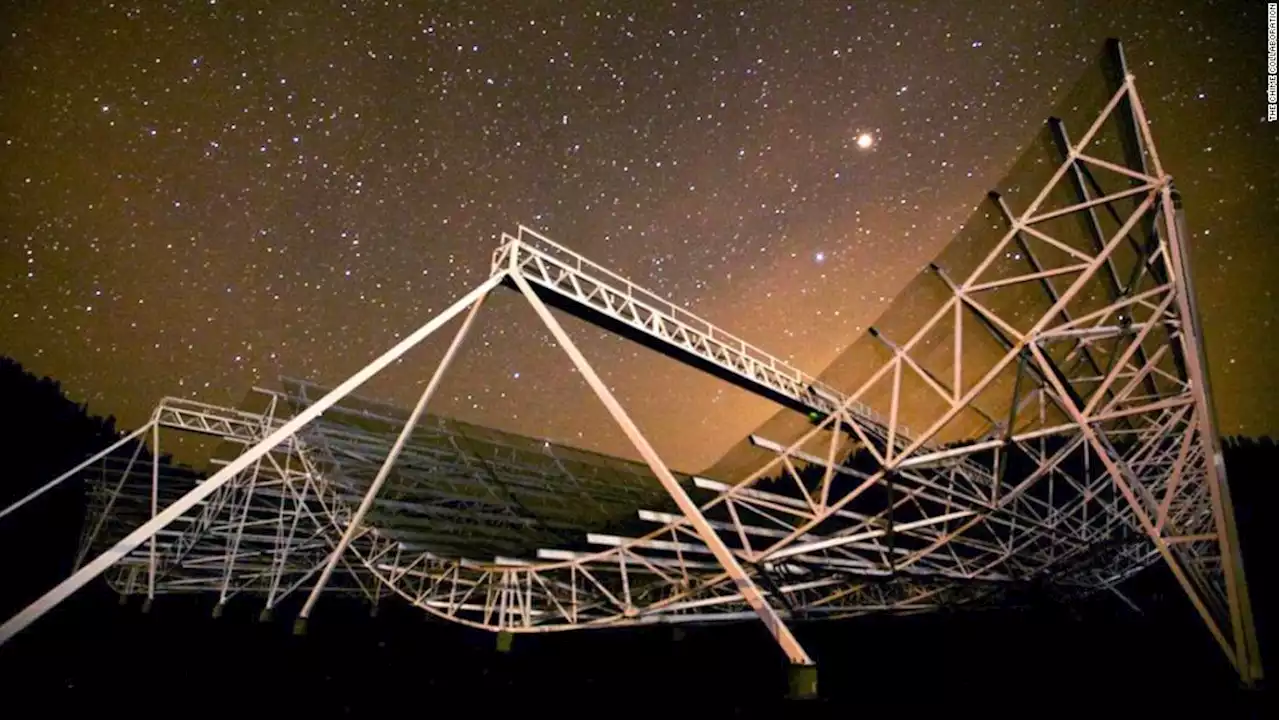Astronomers estimate that the mysterious signal came from a galaxy roughly a billion light-years away.
Astronomers estimate that the signal came from a galaxy roughly a billion light-years away, but the exact location and cause of the burst is unknown. A study detailing the findings published Wednesday in the journal Nature.
People are also reading… Fast radio bursts are so quick and unexpected that they're difficult to observe. Astronomers using CHIME spotted something on December 21, 2019, that immediately caught their attention: a fast radio burst that was"peculiar in many ways," according to Daniele Michilli, a postdoctoral researcher in the Massachusetts Institute of Technology's Kavli Institute for Astrophysics and Space Research.
Michilli was monitoring the data as it came in from CHIME, when the burst occurred. The signal is the longest-lasting fast radio burst to date. An unknown sourceThe research team doesn't know the exact galaxy from which the burst originated and even the distance estimate of a billion light-years is"highly uncertain," Michilli said. While CHIME is primed to search for bursts of radio waves, it's not as good at locating their origin points.
National News Baby stars, dancing galaxies: NASA shows new cosmic views National News James Webb telescope shows it's possible to seek alien life in distant planets' atmospheres Magnetars are neutron stars with incredibly powerful magnetic fields, while radio pulsars release radio waves that appear to pulse as the neutron star rotates. Both stellar objects create a signal akin to the flashing beam from a lighthouse.
Brasil Últimas Notícias, Brasil Manchetes
Similar News:Você também pode ler notícias semelhantes a esta que coletamos de outras fontes de notícias.
 “Boom, Boom, Boom” – MIT Astronomers Detect a Strange “Heartbeat” Billions of Light-Years From EarthA distant neutron star could be the origin of the clear and periodic pattern of fast radio bursts. A strange and persistent radio signal from a far-off galaxy that appears to be flashing with surprising regularity has been detected by astronomers at MIT and elsewhere. The signal has been class
“Boom, Boom, Boom” – MIT Astronomers Detect a Strange “Heartbeat” Billions of Light-Years From EarthA distant neutron star could be the origin of the clear and periodic pattern of fast radio bursts. A strange and persistent radio signal from a far-off galaxy that appears to be flashing with surprising regularity has been detected by astronomers at MIT and elsewhere. The signal has been class
Consulte Mais informação »
 A mysteriously long 'radio heartbeat' is coming from a distant galaxyAstronomers detected the longest fast radio burst to date. They described the signal as a 'radio heartbeat' that's emitting a regular periodic pattern.
A mysteriously long 'radio heartbeat' is coming from a distant galaxyAstronomers detected the longest fast radio burst to date. They described the signal as a 'radio heartbeat' that's emitting a regular periodic pattern.
Consulte Mais informação »
 ‘Heartbeat’ radio signal detected billions of light-years from EarthFast radio bursts (FRB) are usually one-offs so astronomers are particularly intrigued by this most recent FRB which has a consistent burst similar to that of a beating heart.
‘Heartbeat’ radio signal detected billions of light-years from EarthFast radio bursts (FRB) are usually one-offs so astronomers are particularly intrigued by this most recent FRB which has a consistent burst similar to that of a beating heart.
Consulte Mais informação »
 Mysterious cosmic 'heartbeat' detected billions of light-years from EarthRobert Lea is a science journalist in the U.K. whose articles have been published in Physics World, New Scientist, Astronomy Magazine, All About Space, Newsweek and ZME Science. He also writes about science communication for Elsevier and the European Journal of Physics. Rob holds a bachelor of science degree in physics and astronomy from the U.K.’s Open University. Follow him on Twitter sciencef1rst.
Mysterious cosmic 'heartbeat' detected billions of light-years from EarthRobert Lea is a science journalist in the U.K. whose articles have been published in Physics World, New Scientist, Astronomy Magazine, All About Space, Newsweek and ZME Science. He also writes about science communication for Elsevier and the European Journal of Physics. Rob holds a bachelor of science degree in physics and astronomy from the U.K.’s Open University. Follow him on Twitter sciencef1rst.
Consulte Mais informação »
 Mysterious fast radio burst in space has a 'heartbeat' patternA mysterious radio burst with a pattern similar to a heartbeat has been detected about a billion light-years away. The signal is the longest-lasting fast radio burst to date and could be caused by a distant neutron star.
Mysterious fast radio burst in space has a 'heartbeat' patternA mysterious radio burst with a pattern similar to a heartbeat has been detected about a billion light-years away. The signal is the longest-lasting fast radio burst to date and could be caused by a distant neutron star.
Consulte Mais informação »
NPR Cookie Consent and Choices
Consulte Mais informação »
